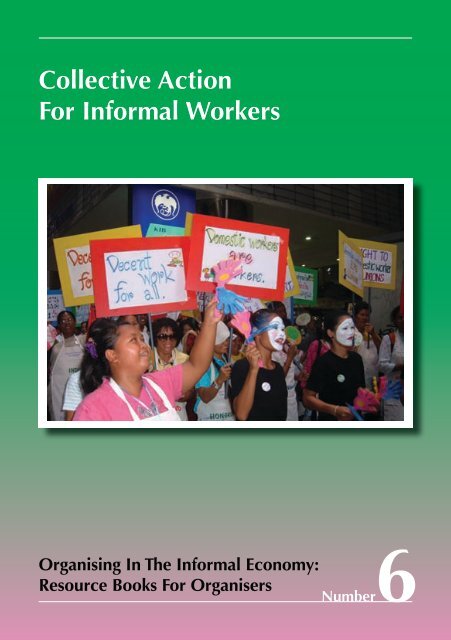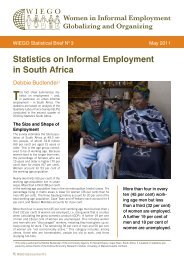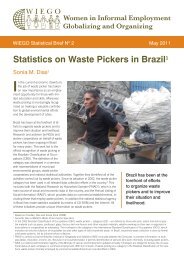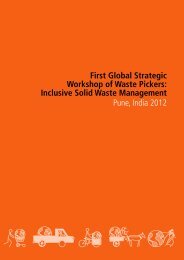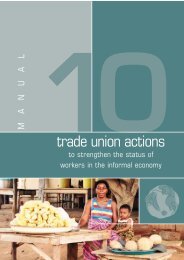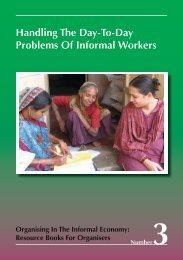Collective Action For Informal Workers - WIEGO
Collective Action For Informal Workers - WIEGO
Collective Action For Informal Workers - WIEGO
Create successful ePaper yourself
Turn your PDF publications into a flip-book with our unique Google optimized e-Paper software.
<strong>Collective</strong> <strong>Action</strong><strong>For</strong> <strong>Informal</strong> <strong>Workers</strong>Organising In The <strong>Informal</strong> Economy:Resource Books <strong>For</strong> OrganisersNumber6
Organising In The <strong>Informal</strong> Economy: Resource Books <strong>For</strong> Organisers, Number 6This series of resource books on Organising in the <strong>Informal</strong> Economy was writtenin response to requests from unions and associations for practical ideas on how to goabout organising workers in the informal economy. It is an attempt to share morewidely the experiences of those already organising informal workers.The project was initiated by the International Coordinating Committee on Organisingin the <strong>Informal</strong> Economy (ICC) composed of representatives from the Self-EmployedWomen’s Association (SEWA) of India, StreetNet International, Ghana Trades UnionCongress (GTUC), Nigeria Labour Congress (NLC), HomeNet South East Asia,Confederacion Revolucionario de Obreros y Campesinos of Mexico (CROC) and theGeneral Federation of Nepal Trade Unions (GEFONT).2Written by: Christine Bonner, Director, Organizationand Representation Programme, <strong>WIEGO</strong>Cover Photo: Chris BonnerDesign and Layout: Julian Luckham, (Luckham Creative)Published by: StreetNet International and <strong>WIEGO</strong>www.streetnet.org.zawww.wiego.org
<strong>Collective</strong> <strong>Action</strong> <strong>For</strong> <strong>Informal</strong> <strong>Workers</strong>ContentsOverview:Organising In The <strong>Informal</strong> Economy:Resource Books <strong>For</strong> Organisers......................................................... iiiIssues And Challenges:<strong>Informal</strong> <strong>Workers</strong> In Different Sectors............................................... v1. IntroductionIn This Book ....................................................................... 1<strong>Collective</strong> <strong>Action</strong> – Opportunities And Challenges<strong>For</strong> <strong>Informal</strong> <strong>Workers</strong>........................................................... 12. <strong>Collective</strong> <strong>Action</strong> And The Organiser........................................3Organiser Roles................................................................... 33. <strong>For</strong>ms Of <strong>Collective</strong> <strong>Action</strong>.......................................................5Women And <strong>Collective</strong> <strong>Action</strong>............................................ 74. Preparing for <strong>Collective</strong> <strong>Action</strong>................................................9Step 1: Prepare The Way: The Strategy............................ 10Step 2: Make Concrete Plans And Preparations............... 13Step 3: Plan a Publicity Strategy....................................... 15Step 4: Build Alliances and Support................................. 18Step 5: Finalise Preparations.............................................. 195. Taking <strong>Action</strong>..........................................................................21Step 6: Carry Out The <strong>Action</strong>........................................... 21Step 7: Evaluate The <strong>Action</strong>.............................................. 25Learning Activities..................................................................................... 26Resources and References............................................................................ 29i
Organising In The <strong>Informal</strong> Economy: Resource Books <strong>For</strong> Organisers, Number 6AcknowledgementsThank you to all the many workers, organisers and their organisations whocontributed, directly or indirectly, to the production of this series of books. Specialthanks are due to Pat Horn, StreetNet International Coordinator, for her valuableadvice and feedback throughout the process, and Crystal Dicks formerly of theInternational Association of <strong>Workers</strong>’ Education Associations (IFWEA) who assistedwith the planning of the books. Our grateful thanks as well go to staff membersat StreetNet International, the Development Institute for Training, Support andEducation for Labour (DITSELA) and Women in <strong>Informal</strong> Employment: Globalizingand Organizing (<strong>WIEGO</strong>). Finally, we are very grateful to the <strong>For</strong>d Foundation forproviding the funds to StreetNet International to produce the books.Photo AcknowledgementsCover: Chris Bonner: Domestic workers’ march, ThailandOverview: Melanie Samson: Waste picker on landfill, South Africa1. StreetNet: Vendors protest against removal, South Africa2. Ana Paola Cueva Navarro: <strong>Informal</strong> workers, Mexico3. KKPKP (Trade Union of Waste pickers): Tableau at a rally, India5. Fabiana Goulart: Waste pickers march against privatisation, Brazilii
<strong>Collective</strong> <strong>Action</strong> <strong>For</strong> <strong>Informal</strong> <strong>Workers</strong>OverviewOrganising in the <strong>Informal</strong> Economy:Resource Books for OrganisersThe BooksThere are six books in the series:1.2.3.4.5.6.Recruiting <strong>Informal</strong> <strong>Workers</strong> intoDemocratic <strong>Workers</strong>’ OrganisationsBuilding and Maintaining a DemocraticOrganisation of <strong>Informal</strong> <strong>Workers</strong>Handling the Day-To-Day Problems of <strong>Informal</strong> <strong>Workers</strong><strong>Collective</strong> Negotiations for <strong>Informal</strong> <strong>Workers</strong>Handling Disputes between <strong>Informal</strong> <strong>Workers</strong> and those in Power<strong>Collective</strong> <strong>Action</strong> for <strong>Informal</strong> <strong>Workers</strong>iii
Organising In The <strong>Informal</strong> Economy: Resource Books <strong>For</strong> Organisers, Number 6The AimsThis series of resource books aims to assist anyone who has the task oforganising workers in the informal economy. It hopes to give organiserspractical ideas on what needs to be done and how to do it.Using the BooksThe resource books provide ideas, guidelines and examples that you candraw upon when organising informal workers.Use them:••as an organising guide: draw on the ideas, checklists and experiences••for information: read, and share your knowledge with others••to generate ideas: create new ways of doing things••as a planning tool: use the steps and strategies to help you plan••to educate and empower: in informal discussions, workshops ortraining sessions.Three key organising principles•• Win real, immediate concrete improvements in workers’ lives•• Give workers a sense of their own power•• Alter power relationships“Be passionate, committed, innovative and creative in your efforts toward theorganisation and mobilisation of workers in the informal economy”.(Kwasi Adu-Amankwah, Secretary-General of Ghana Trades Union Congress,September 2006, addressing the ICC Conference on Organising in the <strong>Informal</strong> Economy)iv
Issues and Challenges:<strong>Informal</strong> <strong>Workers</strong> in Different Sectors<strong>Collective</strong> <strong>Action</strong> <strong>For</strong> <strong>Informal</strong> <strong>Workers</strong>Sector /groupStreet, marketvendors andhawkersHome-basedworkersPriority issuesRight and space to vendFacilities- storage, shelter, toilets,waterProtection against policeharassmentSafety and securityCompetition –protection againstbad effectsAccess to creditEqual income, benefits as factoryworkersIdentifying employerEnd to exploitation by middlemenAccess to regular workAccess to markets (own account)Access to credit (own account)Organising challengesNot regarded as workers by selvesand othersControlled by politicians, “mafia”Fear of harassment by authorities,policeCompetition amongst selves andformal sectorTime spent on organizing means lossof incomeNo forums for bargainingIsolated in homes, invisibleTime-double burden of work andhome careFear of losing workRestrictions imposed by religion,cultureChildren workingUnprotected by labour law ordisguised statusGarmentworkersLiving wageRight to OrganiseExcessive overtimeSecurity of employmentWomen workers are seen as‘seasonal’, ‘supplementary’ wageearnersHarassment of trade unionsOften small workshopsv
Organising In The <strong>Informal</strong> Economy: Resource Books <strong>For</strong> Organisers, Number 6Waste pickersand recyclersAgricultural,forestry andfish workersDomesticworkersTransportworkers(urbanpassenger)Womenworkersall sectorsAll sectorsAccess/right to recyclable wasteIntegration into municipal systemsWork higher up the recyclingchainFair prices for recyclablesRecognition and improved statusHealth and safetyEnd to exploitation by middlemenRight to land and land useRight to natural resourcesRegular workAccess to resources andequipmentAccess to credit and marketsRecognition as workersProtection against dismissal, abuseFreedom of movementFreedom to change jobs (migrant)Less hours, more restBetter living conditionsAccess to routes and passengersProtection against harassmentHealth & safety/ accidentprotectionParking and facilitiesPetrol and spares prices and faresCompetition-protection againstbad effectsSafe and affordable child careIncome protection during/afterchildbirthPhysical securitySexual harassment protectionEqual income for equal valueworkAccess to higher income earningworkBetter and more secure incomeImproved working conditionsSocial protectionLow status and self esteemFear of losing workFear/dependency on middlemenCompetition amongst selvesTime to meet means loss of incomeChild labourNot protected by labour lawScattered locationsIsolated and far distancesChild labourNot protected by labour lawSeasonal or intermittent workIsolated and invisible in homesFear of employers and losing jobsDependency on employer forhousing etcNot protected by labour lawLack of time: long hoursFear of authorities (migrant)MobilityCompetition between selves andformal sectorControl by politicians, “mafia”Threats by employersFear of harassment by police/authoritiesTime for organizing means loss ofincomeFear and lack of confidenceCultural and religious barriersOften in scattered locationsDominated by men in sectorLack of timeChild care and home carevi
<strong>Collective</strong> <strong>Action</strong> <strong>For</strong> <strong>Informal</strong> <strong>Workers</strong>1. IntroductionIn This BookIn this resource book you will find information on the many differentways in which informal workers creatively engage in collective action topress their demands and highlight their situation. You will find examplesof the experiences of different organisations, in different sectors anddifferent countries, and of both women and men. The book givespractical ideas on how to strategise, plan and prepare for action. It looksat mobilising members, building alliances and publicising the action. Atthe end of the book you will find a group activity that you can use inworkshops or when planning collective action.<strong>Collective</strong> <strong>Action</strong> – opportunities andchallenges for informal workers# Opportunities<strong>Collective</strong> action is a key weapon in worker struggles for rights andjustice. It is an important weapon for informal workers. Through actingtogether informal workers can bring their demands to the attention of1
Organising In The <strong>Informal</strong> Economy: Resource Books <strong>For</strong> Organisers, Number 6authorities, employers and the public.If informal workers engage in collectiveaction strategically, backed with goodpublicity, they can force concessionsfrom authorities and employers, buildpublic support and demonstrate thepower and importance of informalworkers and the work that they do. Definition<strong>Collective</strong> <strong>Action</strong>Any form of united actiontaken by a group of workerswhich has the intention ofpressuring those with authorityand decision making powers toaccede to their demands, eitherimmediately, or as part of alonger term strategy# ChallengesBecause most groups of informal workers do not have negotiating rightsor access to formal dispute resolution mechanisms, collective actionis often the only way they can make their voices and demands heard.When they do succeed in negotiating with those in power, they oftenneed to reinforce the negotiations, or follow up failed negotiations, byusing collective action.However, taking action can be risky for informal workers. Unlikeworkers in the formal economy, whose strikes often carry someprotection under labour law, informal workers do not usually have thisprotection. When they act, they are vulnerable to further harassmentand intimidation by police, authorities and/or employers. On the otherhand, those in authority may ignore their action. Unlike formal workers,the bargaining power of many groups of informal workers, or theirpower to directly “hurt” an opponent, is not very strong. Many groupsof informal workers cannot use the strike weapon. They have to findalternative forms of action that will be appropriate to their situation, butare still effective.“Big struggle big gain; small struggle small gain; No struggle no gain.”(Chinese worker saying-thanks to CAW)2
<strong>Collective</strong> <strong>Action</strong> <strong>For</strong> <strong>Informal</strong> <strong>Workers</strong>2. <strong>Collective</strong> <strong>Action</strong> And The OrganiserWhen collective action is on the agenda, organisers in the informaleconomy need to be adaptable, quick thinking, creative and strategic.Different circumstances call for different roles.Organiser roles#Where action is plannedWhere action is planned in advance, support leaders and workers in:••••••••••Analysing the potential risks and benefits of taking actionDeveloping creative and appropriate strategiesMaking the necessary preparations for action to successfully andsafely take placeEnsuring full member participation and democratic decision makingprocessesProviding ongoing education, encouragement, technical support andmonitoring3
Organising In The <strong>Informal</strong> Economy: Resource Books <strong>For</strong> Organisers, Number 6#Where action is spontaneousWhere members take “spontaneous” action to defend themselvesagainst evictions, harassment and violence by police and authorities,show leadership. Be:••••••••••••••••a peace-makera mediator or go-betweena negotiatora militant leadera defendera care givera publicistsan advisor and educator#Where action is difficultIt may be difficult for workers scattered and isolated in their own homes,or in the households of employers. It may be difficult where workerslack experience or fear authorities, employers or their partners. It isdifficult for migrant workers, especially undocumented migrants, and forwomen whose religion restricts their movements. Support your membersby:••••••••••Educating and sharing experiences about collective actionBuilding confidence and solidarityMobilising workers and community supportProviding know-how and practical assistanceFinding creative alternatives4
<strong>Collective</strong> <strong>Action</strong> <strong>For</strong> <strong>Informal</strong> <strong>Workers</strong>3. <strong>For</strong>ms Of <strong>Collective</strong> <strong>Action</strong><strong>Informal</strong> economy organisers should have lots of information and ideason different forms of collective action. Where and how have informalworkers used collective action successfully and where less so? What arethe experiences in your sector? What lessons can we draw from theexperiences of other workers? Use this information to help workersthink through the options and find creative and strategic ways ofpressing their demands.<strong>Workers</strong> in different occupations will take action appropriate to theircircumstances. Some of the more common forms of collective actionused by workers in different jobs are listed below.5
Organising In The <strong>Informal</strong> Economy: Resource Books <strong>For</strong> Organisers, Number 6Experiences: <strong>For</strong>ms of collective action: summaryby occupational groupVendors:Taxi drivers:Homeworkers:boycotts- of market and site levies; of new trading sitesmarches- to offices of authoritiesralliesstrikesblockades- of roadsboycotts -of new taxi ranksrallies (with other workers e.g. on May Day)demonstrations- placardsDomestic workers: demonstrations- placardsmarchesralliespetitionsWaste collectors:Sex workers:Casual/seasonalworkers:rallies“theatre”marchesdemonstrationsdemonstrationsmarchesstrikesmarchesTIP: Build up your own collection of informal workers+ collective action experiences. It will provide you with a store ofideas to draw upon in future.6 Experiences:<strong>Informal</strong> workers take collective actionCycle rally: waste pickers in IndiaOn World Environment Day, in Delhi, waste pickers took part in a cycle rally to highlightthe impact privatisation of waste management has had on them. They also submitted amemorandum to the Mayor demanding a right over waste. “While rag pickers have beenan essential part of the waste disposal cycle, with privatisation of collection of waste by theMCD (Municipal Corporation of Delhi) they have been left out completely. With no othersource of income, they are being further pushed to the margins”.(The Hindu, 5 June 2007; Chintan Environmental Research & <strong>Action</strong> Group)
<strong>Collective</strong> <strong>Action</strong> <strong>For</strong> <strong>Informal</strong> <strong>Workers</strong>Placard demonstration: domestic workers in SA“Prisoners in our own rooms”“Will you babysit tonight, but do you pay me overtime? I have nights you know”The South African Domestic Service and Allied <strong>Workers</strong>’ Union (SADSAWU) held apeaceful protest in Cape Town. <strong>Workers</strong> were armed with placards bearing slogans such asthose above. They drew attention to their long hours, poor conditions and low wages. Theirplacards highlighted abuses by employers such as underpayment and lack of safety. Theyplan more demonstrations. (Cape Times, 23 June 2006)Strike for a fare increase: taxi drivers in the PhilippinesIn 2004 transport unions, organising informal taxi drivers, joined together in a nationwidejeepney strike. They demanded that government raise the minimum fare by 50 percentbecause of increases in petrol and oil. By 2pm the transport department conceded to thestrikers’ demand.(International Transport Worker’s Federation, ITF,2006, Organising <strong>Informal</strong> Transport <strong>Workers</strong>. GlobalResearch Project. Overview Report)Boycott of levies: vendors in KenyaNairobi street vendors applied pressure on the council by not paying levies for two weeks.The Council agreed to provide cleaning facilities and water, with the support of theprovincial authorities.(StreetNet News)Protest rally against contract work in ThailandIn Thailand, more than 1,000 workers held a protest rally in front of Government Housedemanding an end to the contract labour system and an amendment to the New LaborProtection Act. <strong>Workers</strong> ended their protest by a symbolic burning of the Labour Law. Theyposted a petition to the Prime Minister urging him to abolish the contract labour system, atthe gate of Government House. It was a peaceful rally. <strong>Workers</strong> promised to launch more,bigger protest actions if government did not heed their demands and grievances.(Alliance of Democratic Trade Unions, News Release, 2005)Blockade by Benin motorcycle taxi driversSynazeb, a motorcycle taxi drivers’ union, held a march and blockaded roads, after criminalsmurdered a union member. No taxi drivers worked that day. Roads were blocked for twohours. Security forces were forced to negotiate with Synazeb. They met the union’s demandfor a motorcycle park for union members to use. ‘This was one of the union’s successes,especially considering that it is not often the authorities make concessions, especially tomotorcycle taxi drivers”.(ITF Report)Women and collective actionIt is sometimes difficult for informal women workers to take action,due to the scattered nature of their work places, their weak bargainingpositions, and for cultural, religious and social reasons. But this doesnot mean that women are less militant and brave than their male7
Organising In The <strong>Informal</strong> Economy: Resource Books <strong>For</strong> Organisers, Number 6counterpart. Given the chance, the opposite is often true. Many timeswomen have proved to be stronger and more determined than men.And, where they prefer not to use confrontational strategies, they oftendevise creative collective actions to press their demands.Recognise and build on the strength and creativity of your womenmembers.••••••••••Ensure that women have the opportunity to lead.Involve women in the planning.Listen to, and respect, women’s ideas.Engage in actions that women are comfortable with.Hold meetings and actions at suitable times and places. Experiences:Women make an impactWomen waste pickers in India find creative waysMembers of the KKPKP (trade union of waste pickers, mainly women) held a public rallyto demand identity cards endorsed by the municipality. They carried the tools of their trade(sacks, baskets and push carts). At another rally they put black bags over their heads as if theywere going to the gallows. This was led by a tableau of a woman with a hangman’s noosearound her neck with the words,” if you cannot offer us legislative protection, you may aswell send us to the gallows”.(P.Chikarmane, L.Narayan, Organising the Unorganised. A Case Study of the Kagad Kach PatraKashtakari Panchayat (Trade Union of Waste-pickers)Migrant Chinese women push men into action“ male workers were reluctant. Finally a large crowd of women workers gathered at thedormitories and yelled at the male workers, scolding them as useless, exhorting them to actas bravely as Xinglai workers did (in a strike). The yelling and scolding aroused the courageof male workers, and they left their dormitories and gathered at the playing field. The fightback then began”.(Committee for Asian Women, CAW, 2007, Women Migrant <strong>Workers</strong> under Chinese Social Apartheid.)Market women in Guinea strengthen general strike“ In the recent strike in Guinea, market women’s role in a general strike was decisive in thedemands being won”.(ICC, Report on International Conference on Organising in the <strong>Informal</strong> Economy , Ghana ,2006)8
<strong>Collective</strong> <strong>Action</strong> <strong>For</strong> <strong>Informal</strong> <strong>Workers</strong>4. Preparing for <strong>Collective</strong> <strong>Action</strong>Taking collective action: an overview1. Prepare the way: the strategyNeed Objectives Strategy*Identify the *Clarify * Assess environment,need for action immediate aims members and organisation* In–principle * Clarify how it fits * Take decision anddecision with long-term goals develop overall strategy2. Make concrete plans and preparationsPlan of <strong>Action</strong> Practical details People* Plan where, * Get resources * Get mandate andwhen, how and whomobilise members* Arrange transport,* Decide tactics press, permission, * Chose action teamcommunication tools,* Publicity strategy meetings etc * Build alliances3. Carry out the actionCoordination Control Communication* Have action * Have strong * Amongst action teamcommittee leadership * With leaders, members* With allies* Be alert: *Intervene in conflict * With presslook, listen, inform* With public* Encourage * With opponents -disciplinenegotiate4. Evaluate the actionOutcomes:Organisation:Members:Lessons:achievements and failuresstrengths and weaknessespowerful and empowered: more or lessnow and futureLIVE TO FIGHT ANOTHER DAY!PLAN THE WAY FORWARD9
Organising In The <strong>Informal</strong> Economy: Resource Books <strong>For</strong> Organisers, Number 6Step 1: Prepare the way: the strategyTIP: There is an old saying, “ To fail to prepare is to prepare+ to fail”. Take these words seriously!Be clear about the need, objectives and overall strategy for collectiveaction. Exercise power selectively and strategically.# Why collective action?Before your members decide on action, be sure everyone is clearwhy there should be action. This is especially important if members’incomes and safety are likely to be affected, such as in a strike, blockadeor a large march in working time. Are you taking action because it is anecessary strategy or because it is a useful one? Are their other optionsif action is risky? Consider:Is action needed:••••••••••because of a break down in negotiations?because power seems to be the only thing that your opponent willlisten to?because you have been attacked and have no other way of defendingyourselves?because your opponent refuses to talk or negotiate with you?to shake up your opponent who is failing to implement anagreement or using delaying or avoidance tactics?Is action useful:•• to bring your demands to the attention of authorities?•• to show your power and “threaten” your opponent during thecourse of a negotiation or a dispute?•• to highlight your situation and gain public support?•• to mobilise, educate, unite and empower workers?10
Is action appropriate:••••••does the issue warrant taking action?can the issue be resolved or taken up differently?can it make a difference?<strong>Collective</strong> <strong>Action</strong> <strong>For</strong> <strong>Informal</strong> <strong>Workers</strong># Clarify your aims and objectivesIt is important to be clear what you want to get out of the action andhow this fits in with your organisation’s long-term goals.••••••Do you expect to fully achieve all your demands immediately?Will members be satisfied with a partial victory through acompromise?Will successfully highlighting demands and mobilising workers beyour main aim?# Develop the overall strategyLook more closely at the risks and benefits of taking action. This willhelp you decide on the form of action most likely to lead to success. Usethe checklist below to help you and the members analyse the situation.-Check List 1:Assessing the risks and benefits of actionExternal <strong>For</strong>ces X ?Is the environment generally hostile towards us?Are there laws and regulations that will protect us if we comply?Do police have a history of repression or violence against workers?Is the public generally sympathetic to our situation/demands?Do we have allies and friends that we can work with or who willsupport us?Do we have sympathetic press and media contacts?Our Opponent(s)Have we clearly identified all our opponents?Does the opponent have a positive attitude towards your organisation?Is your relationship with the opponent “reasonable” ?Will action directly hurt /negatively affect the opponent?11
Organising In The <strong>Informal</strong> Economy: Resource Books <strong>For</strong> Organisers, Number 6Is the opponent likely to concede to demands under pressure?Can they meet your demands?Is the opponent able to make decisions?Is the opponent concerned about public opinion?Do we know of weaknesses that we can exploit?Do we know of strengths that might block or hurt us?Our organisationAre members truly ready for action?Are all members involved in making decisions about action, includingwomen members?Are members united and strong?Do members understand the purpose of the action and have realisticexpectations?Do we have the know-how and skills to coordinate and administersuccessful action?Do we have strong, capable and trusted leaders?Does the organisation have the necessary resources?Do we have all the information that we need?Gather missing information (research). Consolidate the analysis of:••••••••12Your strong and weak pointsYour opponent’s strengths and weaknessesRisks and benefits of taking actionChances of success.In the light of your overall assessment exploredifferent types of action and develop options.You are now ready to take a firm decisionon action, and to plot your overall strategy.This should include:••••••••<strong>Workers</strong>’ demandsWho the demands are directed toObjectives and expectationsWhat type of action DefinitionA StrategyIs a big-picture plan toachieve organisationalobjectivesA TacticIs the method you use toachieve the larger strategy
••••••••••••••<strong>Collective</strong> <strong>Action</strong> <strong>For</strong> <strong>Informal</strong> <strong>Workers</strong>Overall approach: “war”, peaceful protest, retaliationExtent of the action: local, nationalLength of the action: short, over a specific time, until the demandsare metWhether to go it alone or act in alliance with other organisationsA one-off issue or part of a long-term strategy or campaignAn approach to publicising the actionHow and when to retreat if necessary# A democratic and empowering processMake this assessment and strategy phase as participatory as possible.Use it to educate and empower members about collective action. Holdinformal and formal meetings. Send out the message with leaders,organisers and members. Gather information on what workers aresaying. Take the decision for action collectively, in the appropriatestructure in your organisation.Step 2: Make concrete plans and preparations# Work collectively: build the action teamAlways work collectively. Work with a team. This could be a leadershipteam; a coordinating committee or a strike committee depending on theaction. Women should be fully represented in the team. It should haveclearly defined powers, authority and reporting guidelines. Membersshould choose and support the team.# Draw up the <strong>Action</strong> PlanDraw up a plan of action with the team to flesh out your strategy. Itwill include practical planning of activities before, during and afterthe action. It will include planning your tactics. Include a list ofall the preparatory activities you need to do; who is responsible forimplementing them and the deadline for completion. You could usesome simple planning tools to assist your team, and to inform others,such as a time line and an action-planning sheet.13
Organising In The <strong>Informal</strong> Economy: Resource Books <strong>For</strong> Organisers, Number 6Time-line exampleConstruct a time-line working backwards from the action date. This willshow the deadlines for completing tasks and dates of key activities.PamphletOutVisitSitesTalk toAlliesGetpermitWorkermeetingTeammeetingMarshallmeetingBriefpressFinalCheckTheMarchApril 2 12 15 18 20 21 26 29 30 1 May<strong>Action</strong> planning sheet exampleDevelop this collectively with the team. If possible, draw it on a largesheet of paper and pin it up in your office or regular meeting place.When something is completed, tick it off. It is a reminder and amotivator! Everyone can have their own, smaller version too.Task Who? By when? ResourcesPrepare anddistributepamphletsWrite, layout Media officer 25 March Computer, examplesof old pamphletsPrinted Admin assistant 28 March Photocopyingfacilities, cheque forpaymentDistributedAdmin assistant,action team,organisers2 April PamphletsDistribution listsVisit all work sites All organisers 12 April PamphletsJoining formsNewsletterPenong market Dan, PortiaKalapur roadMay, LuciaBrief allies 15 April Pamphlets,constitution, pressclippingsTU federation General SecretaryNGO allianceLawyers for JusticePresidentOrganiser: Mirriam14
<strong>Collective</strong> <strong>Action</strong> <strong>For</strong> <strong>Informal</strong> <strong>Workers</strong># Prepare your tactics, “what if ?”Use “what if ” questions to help the team develop action tactics.Examples: What (will we do) if?Member participation is poor?The speaker fails to turn up or is late?The press does not arrive?The police block the road?The police threaten or attack workers?<strong>Workers</strong> retaliate or attack police?The mayor refuses to accept our memorandum and demands?The mayor sends out a junior official to speak to us?<strong>Workers</strong> are not disciplined?Marshalls or leaders cannot control workers?We run over the time on our permit?Our demands are not met?Unity starts to crack?Step 3: Plan a publicity strategyIf collective action is to be effective in pressurising those in authority toagree to demands, it must have the power to affect the opponent. Or itmust demonstrate the power, or potential power, to do so in the future.You need members, workers, authorities, allies, enemies and the publicto sit up and notice the action. A well-prepared publicity and mediastrategy is needed.It is important to plan your strategy in line with the type of action,the extent of the action, the desired outcomes and your organisation’sresources and capacity. <strong>For</strong> example, a short, localised strike in a smallworkshop by members of an association with few resources, mayrequire community pressure to help resolve the dispute. The strategymight be to inform community elders and leaders by word of mouth,and to distribute an informal leaflet amongst workers and communitymembers. It would be pointless trying to get the national press to reporton such action.15
Organising In The <strong>Informal</strong> Economy: Resource Books <strong>For</strong> Organisers, Number 6# Plan who to target and how to do itDraw up a table to help you develop a publicity and media strategy.Then draw up a detailed action plan to make sure things happen!This will include making detailed lists of useful press contacts, workerorganisations, NGOs, opinion makers.+ TIP:Most people are too busy to read!•• Have a short, clear message•• Use clear, simple language•• Use languages your target group will understand•• Tailor the media to the intended audience•• Make it interesting•• Use facts and emotionDeveloping a publicity and media strategy-exampleTarget group Objectives Media & publicityMembersOpponentsWorker organisations/NGOs16Inform and mobiliseBuild unity and solidarityCounter negativepropagandaHighlight situation ofworkersInform of demandsCreate a “threat”Mobilise supportBuild alliances and solidarity<strong>For</strong>mal structures andinformal channels (word ofmouth)Short, clear pamphlets inworker languagesSlogansRadio, pressSMS, telephones, e-mails ifavailableLetter or memo informingof action and with demands,and /orLeak information throughcontactsLocal pressPersonal visitsCircular letter/memoPamphletsPublicise action in theirmediaPress and radio
<strong>Collective</strong> <strong>Action</strong> <strong>For</strong> <strong>Informal</strong> <strong>Workers</strong>Opinion makersPublicHighlight and bring to theirattention situation anddemands of workersBuild supportCounter negative publicityHighlight and bring to theirattention situation anddemands of workersBuild supportCounter negative publicityLetters/memosLocal and national pressIn-depth articlesPressPamphletsWeb sites# Plan a creative approach•• Present information in a way that will motivate your members andattract other workers.•• Find an angle to your story that will attract the attention of a widerange of people.•• Be ready to seize opportunities that will raise the profile of theaction for the press.•• Include something dramatic, unusual, eye-catching, topical orembarrassing in the action that you can alert the press about.+ TIP:Work hard to get the press involved. But don’t rely on them.The press is interested in selling newspapers. The story must be ofhigh interest to the majority of their readers. If it is sensational, thenall the better! <strong>Informal</strong> workers struggle for recognition. Editors mayconsider other stories more newsworthy.17
Organising In The <strong>Informal</strong> Economy: Resource Books <strong>For</strong> Organisers, Number 6 Experiences:Using the press<strong>Informal</strong> workers in Malawi seize an opportunity to get press publicityStreet and market vendors were evicted by armed police during a so-called ‘clean-up’operation that affected an estimated 30 000 street and market vendors in Malawi.“MUFIS (Malawi Union for the <strong>Informal</strong> Sector) took advantage of our (StreetNetInternational) visit to call a press conference on 11th May to publicly encourage the Malawigovernment to engage in dialogue with MUFIS in finding a lasting solution to the problemsof street vendors.At the press conference, we denounced the unilateral decision by government and its use offorce against street vendors. We also called on government to respect the economic rightsof its people and to use practices that are acceptable, citing the example of Zambia wheredialogue with government has been productive, rather than the example of Zimbabwewhose ‘clean-up’ operation has left many thousands of people homeless and without meansto earn an income. We urged government to put in place facilities in all places where thestreet vendors have been forced to trade.The press conference was attended by 10 media organisations. As a result, we had goodcoverage of MUFIS and StreetNet’s opposition to the Malawi government’s approach to theinformal economy”.(StreetNet News, #8, September 2006)Step 4: Build Alliances and SupportYou have identified your allies and potential supporters. Go out thereand discuss in detail what role they will play.••••••••••••Will they participate in the action?Will they make a press statement in support of worker demands?Will they write a letter to your opponent supporting your demands?Will they provide material support: money, printing facilities, legaladvice, sound equipment?Will they provide advice, education and sharing of experiences?Will they assist in a crisis?18
<strong>Collective</strong> <strong>Action</strong> <strong>For</strong> <strong>Informal</strong> <strong>Workers</strong> Experiences:Building alliancesSEWA mobilises its customers<strong>For</strong> 25-30 years, more than 300 women vendors, members of the Self Employed Women’sAssociation (SEWA), India, have sold goods in the Gridharnagar to Ghevar Complex road.The Ahmedabad Municipal Corporation wanted to stop them from vending there. Everysingle day the trucks and officials of the Estate Department would come and evict thevendors and confiscate and destroy their goods. SEWA tried to negotiate with the MunicipalCommissioner, but their efforts fell on deaf ears. The Commissioner told SEWA that theyhad received complaints from nearby shops. SEWA changed its tactics. It decided to exploitthe goodwill of the local residents, who had been purchasing fruits and vegetables from thevendors for years and were highly supportive of them. SEWA started a letter campaign. Itgot the residents to write letters to the Municipal Commissioner stating that they supportedthe vendors and why they wanted the vendors to remain.(Streetnet International meeting on collective bargaining in the informal economy and laws and litigationstrategies in street vending sector, Senegal, March 2007)Step 5: Finalise Preparations# Mobilise workersUse this period to constantly mobilise workers for action. Build theirconfidence, unity and power. Involve as many workers as possible in thepreparations. Involve them in distributing pamphlets, holding informalmeetings with members, informing their families and communities andpreparing placards. Hold regular meetings with members. Give regularprogress reports. Get news into the press and on the radio. Be creative!Don’t forget to include women.# Monitor preparationsMeet regularly and monitor the action plan. Review the plan and makeamendments if necessary. Do a final check on your readiness for action.19
Organising In The <strong>Informal</strong> Economy: Resource Books <strong>For</strong> Organisers, Number 6-Check List 2:Are we ready for action?Are members ready and mobilised for action?Are members clear about the plan of action, including times, venues?Has the venue (s) been arranged?Do you have a permit or written permission where necessary?Have you met with the chief of police or authorities?Has transport been arranged?Have speakers confirmed?Are the placards, banners, pamphlets, costumes ready?Do you have hailers, public address systems, cell phones?Are marshalls fully briefed and ready?Is the action committee ready to handle crises, unexpected events?Has the press been informed?Are our allies briefed and committed to support the action?Are documents for the opponents prepared?Does everyone know their roles and responsibilities?Have we arranged where and when to meet after the action?# Crisis! Is planning impossible?<strong>Informal</strong> worker organisations cannot always follow such a carefulplanning process. When informal workers are attacked by employers,authorities, criminals and sometime from “rival” workers, they oftenreact immediately to defend themselves, or to proactively attack. Thereis a crisis! Don’t react immediately. A few minutes to think and plan maymake all the difference to the outcome of the crisis.20
<strong>Collective</strong> <strong>Action</strong> <strong>For</strong> <strong>Informal</strong> <strong>Workers</strong>5. Taking <strong>Action</strong>Step 6: Carry out the actionSuccessful action needs to be well coordinated. It needs good channelsof communication with members and externally. Good action iscontrolled and well disciplined action.# CoordinationThe action /leadership team are responsible for coordinating the action.Where the action is taking place in different centres and/or lasts overa long period of time, you will need a coordination centre equippedwith good communication tools. But for short, localised action, wellorganised,committed and self-disciplined people can do the jobeffectively with minimum resources.Allocate clear roles, responsibilities and powers. Set times for regularcommunication. If the team is physically separated, work out how todo this effectively. Agree the communication system. Agree who is the21
Organising In The <strong>Informal</strong> Economy: Resource Books <strong>For</strong> Organisers, Number 6public face of the organisation and who can speak to the press. Choosestrong and trusted leaders to speak to workers, or intervene in a crisis.Example: Strike committee rolesPicketingDemosAlliancesCoordinate support activitiesGatherinformationStrike Committee•• Plan•• Coordinate•• Hold regular meetings•• Report to members•• Work with leadership•• Plan tactics•• Account to structuresLiaise withoffice & adminCoordinate sub committeesFinanceEducationMedia# CommunicationGood communication goes together with effective coordination andeffective action.••Communicate with members. During sustained actions, such asstrikes, it is easy for members to lose hope and give up. You will needa proper communication system in place. This could include dailybulletins, regular pamphlets, ongoing communication with contactsand leaders at different sites and general meetings of members.During short actions, such as demonstrations and marches, keepworkers’ spirits high. Keep communicating through hailers,speakers, songs and through marshalls spreading latest developmentsby word of mouth.22
<strong>Collective</strong> <strong>Action</strong> <strong>For</strong> <strong>Informal</strong> <strong>Workers</strong>••Communicate with the press and public. If your mediastrategy is working, you should have caught the eye of the press. Youmay decide to call a press conference before or during the action.You may arrange for interviews as action takes place. You will makesure that you have informed the press of notable speakers and whenthey will speak. With major action you will be communicating dailywith the press, including radio and television.••Communicate with your opponent/authorities. During amarch you will do this indirectly through banners and T-shirts,public pamphlets and press statements. You may want to delivera memo in front of workers and demand that the authorityfigure address workers. Your demand may be to negotiate onworker demands, or reopen previously failed negotiations. Keepcommunication lines open. Make sure they can find you!# Control and organisational disciplineWith good coordination and communication you should be in a positionto have controlled and disciplined action. At the centre will be theaction team and/or leaders. At the action site(s) marshalls, leaders,activists will help maintain control.Well-disciplined action is more likely to gain public support than actionthat gets out of hand. Well-disciplined action will make it more difficultfor your opponent(s) to refuse to talk or deal with you. Ill-disciplinemay provide an excuse to refuse your demands. It may discredit theorganisation and lead to loss of support by workers and public.Where your tactic is to take a more “aggressive” or threatening stance,plan this carefully. Make it part of a controlled and agreed strategy, notone that arises from anger or ill discipline.# Dealing with harassment and violenceHowever well prepared we are, things do not always go according toplan. It is not uncommon for worker anger to spill into conflict andviolence during collective action. Police, authorities and employersoften provoke this by their violence against informal workers. <strong>Workers</strong>23
Organising In The <strong>Informal</strong> Economy: Resource Books <strong>For</strong> Organisers, Number 6who refuse to participate; the general public who taunt workers; rivalorganisations and criminal elements may also fuel violent clashes.Be proactive: before the action•• Discuss, share experiences and educate leaders and workers onviolence and collective action. Look at the role of informal workersand the role of hostile forces.•• Make sure everyone knows the policy of the organisation on usingviolence during collective action. If there is no policy, agree anapproach.•• Get commitment from leaders and members to abide by the policy/approach.•• Develop guidelines on how members should react if attacked bypolice or others and the role of leaders in such a situation.•• Make sure you have crisis information ready e.g. contact informationof police or relevant persons in authority; trade union leaders,sympathetic lawyers.•• If there is a chance of violence, make sure you organisecommunication tools (hailers, cell phones); water in the event of teargas; first aid equipment.Be interventionist: where violence happens or is threatened•• If workers are attacked without warning, try to lead a retreat tosafety rather than encouraging retaliation (acknowledging thatworkers may need to defend themselves).•• Try and take control of a potentially violent situation by addressingworkers and diffusing anger.•• Make sure key and trusted leaders are accessible to act quickly, andtalk to workers.•• Coordinate with marshalls. Use cell phones if possible.•• Communicate with workers through marshalls and use of hailers.•• Negotiate with the police if they are threatening.Rescue the situation: after the event•• Attend to workers who are injured and support their families.•• Counter negative publicity. Authorities/employers will blame workers.The press will usually blame workers. Publicise the workers’ stories.24
<strong>Collective</strong> <strong>Action</strong> <strong>For</strong> <strong>Informal</strong> <strong>Workers</strong># NegotiationBe ready and prepared to negotiate at any time during action. Youraction may force employers/authorities to the table. Don’t be taken bysurprise. Your negotiating team should be on standby. Your mandateand demands should be clear. You should have planned your strategyand tactics. (See Resource Book 4 on collective negotiations) Beready for “on the spot” negotiations with police, traffic authorities,shopkeepers and with rival organisations.+ TIP:Don’t get carried away by anger and emotion when workerstake spontaneous action. Take a step back and assess the situation.Think clearly and quickly. Working with leaders, try to bring somestructure to the situation. Assess when to advance and when toretreat. Find ways to maximise opportunities and minimise negativeeffects.Step 7: Evaluate the <strong>Action</strong>After collective action, evaluate:•• What were our aims for the action?•• To what extent did we achieve the objectives we set?•• What did we gain; what did we lose?•• What were our strengths and weaknesses as an organisation?•• What were the strengths and weaknesses of our members?•• What lessons can we draw from the action?Be honest in your assessment. At the same time try not to demoraliseworkers if the action did not achieve everything workers expected.Plan a way forward:•• How do we take the gains forward?•• How do we counter any setbacks?•• How can we use the lessons to strengthen organisation and empowermembers?Celebrate success!25
Organising In The <strong>Informal</strong> Economy: Resource Books <strong>For</strong> Organisers, Number 6 LearningActivitiesActivity 1: Do’s and Don’ts of <strong>Collective</strong> <strong>Action</strong>AimTo help you plan for successful collective actionTaskWork in groups:1. Share experiences of successful collective actions that you havebeen involved in or know about. What did the actions achieve?2. List all the things that contributed to the success of the actions.3. If you were to advise other organisations on how to carry outsuccessful collective action what would you tell them to do and notto do? Summarise your ideas on a large “DO” and “DON’T DO”chart.DODON’T4. Pin up your chart and compare with the other groups.26
<strong>Collective</strong> <strong>Action</strong> <strong>For</strong> <strong>Informal</strong> <strong>Workers</strong> LearningActivitiesActivity 2: <strong>Collective</strong> action: what would you do if ?AimTo enhance your skills to respond appropriately to different situationsduring collective actionTaskIn small groups read the situations below. As an organiser/leader:•• What would you do?•• What could you have done to prevent the unwanted incidentoccurring?Situation 1: A marchThe march grows as people on the streets join in. Some of themarchers overturn rubbish bins and throw empty cans at foodvendors. You see two marchers smash a shop window.Situation 2: A demonstrationA huge group of women are demonstrating peacefully outside themayor’s offices. They are holding placards and singing. They arewaiting for the mayor to come out and accept their petition andaddress them on their demands. One hour later than the agreed time,he still has not appeared. <strong>Workers</strong> are getting restless.Situation 3: A rallyOne of the speakers at the rally tells workers that they must stopdemonstrating and take action. They should go now and occupy thelocal government offices. <strong>Workers</strong> stand up from their seats.27
Organising In The <strong>Informal</strong> Economy: Resource Books <strong>For</strong> Organisers, Number 6Situation 4: A blockade<strong>Workers</strong> blockaded the main road in town to highlight their demandsfor safety and security. Police approached the blockade dressed in riotgear (helmets, masks, shields). They were carrying batons, teargas andguns.Situation 5: A strikeNegotiations had failed. Your union called a strike. You were surethat workers supported the strike. But on the day the strike was dueto start only a handful of workers stayed away from work. Only ahandful attended the strike meeting you had called.Chose someone to report.28
<strong>Collective</strong> <strong>Action</strong> <strong>For</strong> <strong>Informal</strong> <strong>Workers</strong>Resources and ReferencesChikarmane, Poornima and Narayan Laxmi, Organising theUnorganised: A Case Study of the Kagad Kach Patra KashtakariPanchayat (Trade Union of Waste-pickers).http://www.wiego.org/program_areas/org_rep/case-kkpkp.pdfCommittee for Asian Women, CAW, 2007, Women Migrant <strong>Workers</strong>under Chinese Social Apartheid . www.cawinfo.org/pdf/final_10.pdfDITSELA, 2005, Organising successful meetingsInternational Coordinating Committee, Report on InternationalConference on Organising in the <strong>Informal</strong> Economy, Ghana 2006.www.streetnet.org.za/english/Iccghanaconf2006.htmInternational Federation of <strong>Workers</strong>’ Education Associations (IFWEA),2006, Building Democratic Worker Organisation and Representation inthe <strong>Informal</strong> Economy. A manual in two parts.International Transport <strong>Workers</strong>’ Federation, ITF, 2006, Organising<strong>Informal</strong> Transport <strong>Workers</strong>: Global Research Project, OverviewReport. www.itfglobal.org/education/Edu-Research.cfmInternational Trade Union Confederation, OnLine Bulletins andSpotlight Interviews, various.www.ituc-csi.org.Smith, Stirling, 2006. Let’s Organize. A SYNDICOOP handbook fortrade unions and operatives about organizing workers in the informaleconomy. A joint publication of the ILO, ICA and ICFTU. http://www.ilo.org/dyn/empent/docs/F652038548/Manualsyndicoop_report.pdfStreetNet News, various. www.streetnet.org.za/english/page5.htmStreetNet International, Report on the StreetNet meeting on collectivebargaining in the informal economy and laws and litigation strategies instreet vending sector, Senegal, March 2007www.streetnet.org.za/english/collectivebargaining.htm29
Organising In The <strong>Informal</strong> Economy: Resource Books <strong>For</strong> Organisers, Number 6War on Want, Alliance for Zambian <strong>Informal</strong> Economy Associations(AZIEA) and the <strong>Workers</strong> Education Association of Zambia (WEAZ).2006. <strong>For</strong>ces for Change: <strong>Informal</strong> Economy Organisations in Africa.www.waronwant.org/attachments/<strong>For</strong>ces%20for%20Change%20-%20<strong>Informal</strong>%20economy%20organisations%20in%20Africa.pdfWeb siteswww.wiego.orgwww.ituc-csi.orgwww.sewa.orgwww.sewaacademy.orgwww.streetnet.org.zawww.homenetsouthasia.orgwww.homenetseasia.orgwww.ilo.orgwww.ifwea.orgwww.cawinfo.orgwww.global-labour.orgwww.ditsela.org.zawww.domesticworkersrights.orgwww.waronwant.orgResource CentreThe Development Institute for Training, Education and Support forLabour, DITSELA, in South Africa has a large collection of localand international trade union education materials. These were usedextensively in preparing the books. <strong>For</strong> access to these resources contactinfo@ditsela.org.za30


